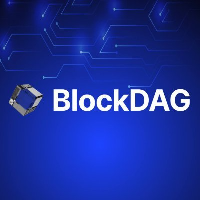
BlockDAG (BDAG)
BlockDAG is a new crypto presale project that can process multiple transactions at the same time. The network combines Bitcoin’s security model with Ethereum’s smart contract capabilities in a single protocol. It can handle over 2,000 transactions per second at launch and targets 10,000+ TPS within the first year.
| Token Name | BlockDAG (BDAG) | Launch Year | 2025 |
| Token Category | Infrastructure / Layer 1 | Blockchain | Custom DAG-based (native blockchain) |
| Offering Type | ICO/Presale | Whitelist Status | Not Required |
| KYC Verification | Not Required | Reward Program | Staking rewards available post-TGE |
| MVP Availability | Alpha Testnet Live | Security Audit | Halborn/Certik |
What is the Current BlockDAG Presale Price?
The BlockDAG presale has raised over $434 million, with more than $40M coming in the last month alone. The presale runs in multiple stages with each new stage bringing a price increase.
| Metric | Value |
| Funds Raised So Far | $434.07M |
| Current Price per Token | $0.005 |
| Next Stage Price | No info available |
For detailed price analysis and future projections, visit our BlockDAG Price Prediction page.
What is BlockDAG Presale and ICO?
BlockDAG tackles the speed bottleneck that holds back other blockchains, and it does it without becoming centralized. Most blockchains add one block at a time in a straight line. BlockDAG lets miners create multiple blocks at once and validate them all together.
The tech runs on the open-source GhostDAG protocol, which takes all those parallel blocks and organizes them into a better structure. This gets rid of orphaned blocks that slow down normal Proof-of-Work systems. You get way higher throughput and still keep Bitcoin-level security.
How to Buy BlockDAG During the Presale
Getting BDAG tokens during the presale is pretty straightforward if you’ve bought crypto before. Here’s a step-by-step guide on how to buy BlockDAG:
- Step 1: Get some crypto from your preferred exchange. If you don’t yet have a wallet, consider using Best Wallet or MetaMask.
- Step 2: Visit the BlockDAG presale page and click “Buy” or “Connect Wallet.” This starts the purchase process.
- Step 3: Choose the amount of $BDAG you want to buy. The presale site will calculate how many tokens you’ll get after fees.
- Step 4: If paying by card, use a mobile crypto wallet or browser extension wallet. Connect it to the BlockDAG site and choose “Card Payment.”
You can buy $BDAG with ETH, USDT, BNB, and a Credit Card.
For a detailed walkthrough with screenshots and troubleshooting tips, see our How to Buy BlockDAG Tokens Guide.
How is the BlockDAG presale structured and priced?
BlockDAG’s token structure puts the community first, with half the supply going to miners and a third available through the presale. The team only keeps 1% for themselves, and there are no VC allocations or private sale rounds.
Tokenomics
BlockDAG’s token distribution is built around community access and long-term network security. Here’s how the 150 billion BDAG supply is distributed:
| Category | Allocation |
| Presale | 33.3% (50 billion) |
| Miners | 50% (75 billion) |
| Community & Ecosystem | 12.7% (19 billion) |
| Liquidity | 3% (4.5 billion) |
| Team | 1% (1.5 billion) |
| Total Supply | 150 billion BDAG |
When Does the BlockDAG Presale Start and End?
The BlockDAG presale is already live and has been running since early 2024. The presale will continue running in stages until either the full 50 billion token allocation sells out or the mainnet launches.
For the latest updates on presale timing and stage transitions, check our BlockDAG presale launch date article.
What Can You Do with BlockDAG Presale?
- Transaction fees – BDAG pays for everything on the network, from simple transfers to running complex smart contracts
- Mining rewards – Miners earn BDAG for securing the network through Proof-of-Work validation
- Staking yield – Lock up your BDAG to earn passive income from network fees
- Governance rights – Vote on protocol upgrades and how ecosystem funds get spent
- Developer incentives – Builders get up to 25% of the fees their apps generate
What Rewards or Bonuses are Available During the Presale?
- Staking rewards – Go live right after the Token Generation Event (TGE), so presale buyers can start earning yield immediately without waiting for exchange listings.
- Developer grants – Teams building on BlockDAG get funding and fee discounts, with successful projects qualifying for extra token allocations from the ecosystem fund.
Why is BlockDAG Presale Gaining Attention?
- Solves the blockchain trilemma – Delivers speed, security, and decentralization together through parallel block production instead of forcing tradeoffs.
- Combines Bitcoin and Ethereum – You get Bitcoin’s security model with Ethereum’s smart contract capabilities in one protocol.
- Real traction – The presale has raised $434M with 312,000+ holders and 1,000+ new participants joining daily
Our BlockDAG Presale Review
Pros:
- Real technical innovation with working testnet showing claimed performance
- Fixes real scalability problems without giving up decentralization
- Transparent tokenomics with no hidden VC deals
- Team includes recognized blockchain researchers and engineers
Cons:
- Complex architecture might create integration challenges for some apps
- Mainnet launch depends on testnet completion going smoothly
- Mining hardware requirements could lock out some participants
- Proof-of-Work could face regulatory pressure like Bitcoin has
Is BlockDAG Presale legit?
Wondering if BlockDAG is legit or a scam?The technology builds on peer-reviewed GhostDAG protocol research published in academic venues. The team includes verifiable people like Dr. Maurice Herlihy from Brown University and CEO Antony Turner from Spirit Blockchain.
The working testnet lets anyone verify claimed performance—projects with only whitepapers carry way higher risk. That said, all presales are high-risk. Tech might face challenges, adoption isn’t guaranteed, and mainnet delays happen often. Only invest what you can afford to lose.
Is BlockDAG Presale Right for You?
- You understand blockchain scalability problems and can evaluate technical solutions
- You can participate in mining or staking to maximize your position
- You think Proof-of-Work creates better decentralization than Proof-of-Stake
- You want exposure to both payment systems and smart contract functionality
- You’re comfortable with presale risk for earlier entry pricing
BlockDAG presale probably isn’t for you if:
- You’re hunting for quick returns or short-term trading plays
- You lack technical knowledge to evaluate the project’s claims and progress
- You need liquidity and can’t lock up funds through a long development period
- You’re uncomfortable with unproven tech that might face unexpected challenges
How we Reviewed This Presale
We dug into the technical docs to understand how the architecture actually works and whether the scalability claims hold up. We cross-referenced the GhostDAG research paper they’re building on and checked if the team’s backgrounds match what they claim.
We also tested the testnet ourselves to see if it hits those transaction speeds, and we compared BlockDAG’s approach to what competitors like Kaspa and Solana are doing.
FAQs
When does the BlockDAG presale end?
Is the BlockDAG presale safe?
How much does BlockDAG cost during the presale?
How do I claim my BlockDAG tokens after the presale?
What payment methods are accepted for the BlockDAG presale?
What are the main risks of participating in BlockDAG presale?
Team
Antony Turner (CEO/Founder), Jeremy Harkness (CTO), Dr. Youssef Khaoulaj (CSO), Steven Clarke (Senior Advisor), Dr. Maurice Herlihy (Blockchain Advisor)
Advisors
Dr. Maurice Herlihy - Professor of Computer Science at Brown University, recognized expert in distributed computing and blockchain consensus mechanisms


